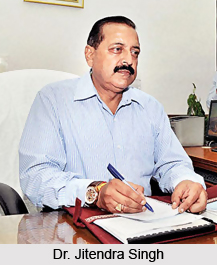 Dr. Jitendra Singh, doctor by profession, is a Professor of Diabetes and Endocrinology, who is now serving as the Minister of Science and Technology (Independent Charge), Earth Sciences (Independent Charge), Prime Minister Office, Personnel, Public Grievances and Pensions, Department of Atomic Energy and the Department of Space in the Cabinet Ministry of Narendra Modi`s Government in 16th Lok Sabha.
Dr. Jitendra Singh, doctor by profession, is a Professor of Diabetes and Endocrinology, who is now serving as the Minister of Science and Technology (Independent Charge), Earth Sciences (Independent Charge), Prime Minister Office, Personnel, Public Grievances and Pensions, Department of Atomic Energy and the Department of Space in the Cabinet Ministry of Narendra Modi`s Government in 16th Lok Sabha.
Early Life of Dr. Jitendra Singh
Dr. Jitendra Singh was born on 6th November 1956. Besides this profession, he is a consultant and clinical practitioner also. He is closely associated with the diabetes awareness programmes in India. He is a person mainly focused on young diabetes.
Political Career of Dr. Jitendra Singh
Dr. Jitendra Singh came into limelight of regional political scenario of North India when he joined with Bharatiya Janata Party as a National Executive member and Chief Spokesperson for the state of Jammu and Kashmir. He plunged into national and regional politics while he was serving in Jammu and Kashmir Government Medical College and Hospital. He stood as the candidate of Bharatiya Janata Party from Udhampur seat after retiring from his job. This 56 years old veteran professor and consultant won the Udhampur seat in the Indian General Election 2014 conducted by the Election Commission of India, for the 16th Lok Sabha by defeating Indian National Congress candidate and the stalwart of Jammu and Kashmir political hemisphere, Ghulam Nabi Azad, the former Union Health Minister of India during the Indian National Congress led United Progressive Alliance (UPA) regime, headed by the former Prime Minister of India, Dr. Manmohan Singh.
Dr. Jitendra Singh is a new face in Jammu and Kashmir regional political hemisphere. He joined with Bharatiya Janata Party and his winning paved the meteoric rise of BJP in Jammu and Kashmir. Dr. Jitendra Singh was sworn in as Minister of State, where he will look after the offices of Science and Technology, Earth Sciences, Prime Minister Office, Personnel, Public Grievances and Pensions, Department of Atomic Energy and the Department of Space in the Cabinet Ministry of Bharatiya Janata Party led National Democratic Alliance government, headed by Narendra Modi.
Dr. Jitendra Singh authored many medical books and he also expresses his views as a columnist in different regional and national newspapers, magazines and medical periodicals. He authored eight medical books on diabetes.




















